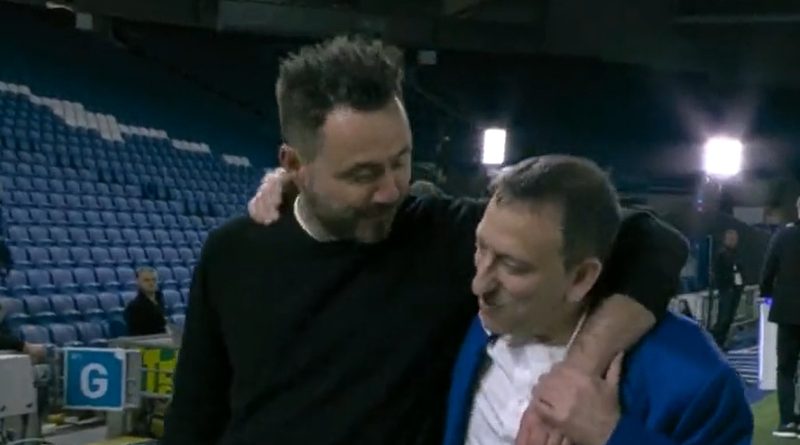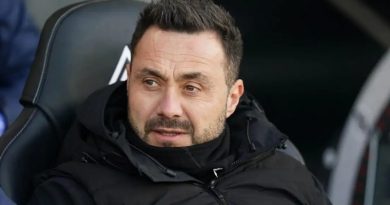Brighton and De Zerbi: A divorce both parties may go onto regret
With the dust now settled on the news the Roberto De Zerbi Era is over at Brighton comes the time to reflect on whether Tony Bloom has made the correct decision in parting ways with his head coach.
Tin hat on here. Having sunk half a billion pounds of his own fortune into transforming the Albion, Bloom is beyond reproach in the eyes of many Seagulls supporters.
Which is fair enough. He built the Amex. The training ground. Took Brighton from League One relegation strugglers into the top six of the Premier League. Almost every decision Bloom has taken in 15 years at the helm has been correct. But that does not mean he is above criticism.
Appointing Sami Hyypia, sticking with him for so long and turning down his attempts to resign despite it being obvious he was not up to the job was a mistake.
The Albion being against an independent football regulator smacks of self-interest rather than thinking about the good of the wider game.
You would hope the board of a club like Brighton – who have been there, done that and got the t-shirt when it comes to nearly going out of business – would use the past as a reference point to understand why football needs regulation.
The Albion might be well-run currently, but that does not mean the other 91 clubs do not need the sort of protection we could have benefited from in the 1990s.
Speaking of which, it is still hard to believe Brighton put out a tribute to Greg Stanley on the official club website upon his death in 2000.
The man was just as culpable as Bill Archer and David Bellotti for the sale of the Goldstone Ground and nearly driving the club out of business.
And then there is the well-known rift with Dick Knight, without whom there would not be a Brighton & Hove Albion. The good Bloom has done far outweighs the bad, but that does not mean there have been no questionable decisions along the way.
So, what of the decision to dispense with De Zerbi? Correct or mistake? As with all matters so complex, probably a bit of both. Right now though, it seems like a divorce both parties might regret in the future.
Brighton form in the second half of the season was a concern
First, the elephant in the room. Brighton could have feasibly sacked De Zerbi based on second half of the season form alone.
Through the first 19 Premier League games, the Albion were eighth in the table. Through the final 19, they sat 17th in the form table. Only just above Burnley.
Replicate that form across the whole 2024-25 season and Brighton would be in serious danger of relegation to the Championship.
There were of course extenuating circumstances for the drop off. Injuries hit hard from February onwards, particularly the loss of Kaoru Mitoma and Joao Pedro at the same time.
Having been so free scoring for the most part under De Zerbi, Brighton were suddenly struggling for goals. Burnley goalkeeper Arijanet Muric famously won the Albion’s April 2024 Goal of the Month award by default for an own goal.
From being without Mitoma in mid-February, Brighton scored only eight times in 16 matches. Two of those were provided by opponents; Muric for the Clarets and Nottingham Forest defender Andrew Omobamidele heading in an own goal when the Albion beat the Tricky Trees 1-0 at the Amex in March.
Six Brighton goals in three months is appalling. And as much as injuries and burnout were to blame, De Zerbi seemed unable to suitably adjust his tactics to find another way to win.
The setup for the 4-0 defeat to Roma was ridiculously naïve. So too the tactics when the Albion were eliminated from the FA Cup at Wolves.
There was so much hope and expectation of what two good cup runs could mean for the Seagulls. To throw away good opportunities in both within the space of a week proved hugely destructive to the campaign as a whole.
It was only in the last three weeks that Brighton became slightly more pragmatic, resulting in a win over Aston Villa, a draw at Newcastle and better performances even in defeat against Chelsea and Manchester United.
The lack of Plan B became a stick with which to beat De Zerbi. When DeZerbiBall worked and Brighton were not crippled with injuries, it was glorious. But when it didn’t, it tended to go badly wrong.
That suggests the head coach is perhaps too headstrong and wedded to his beliefs. A personality trait which extends beyond just footballing style, seemingly.
De Zerbi criticism of the board
When the news first broke that De Zerbi was to leave Brighton, we theorised that Bloom and Paul Barber would have been considering pulling the trigger from the moment the Italian began questioning the board in public.
Call it the Parable of Gus Poyet. Brighton do not take well to criticism. They remain quite possibly the only club in English football to release not one, but two public statements criticising the independent football ombudsman for finding against them in a case.
The IFO has no power. They can only admonish clubs or make recommendations. Brighton can currently sweep such findings aside, dismissing and queastioning the work of an independent body who has no bias.
Little wonder they are so against a proper regulator with actual powers being able to judge the Albion’s actions, rather than the club marking its own homework.
De Zerbi looked in big trouble the moment he said the ownership would need to learn lessons from the 2023-24 season. The question was, did his achievements in guiding Brighton into Europe for the first time give him enough credit in the bank to get away with public criticism?
No was the answer, as confirmed by Andy Naylor in The Athletic. The questioning of the board had not gone down well in the corridors of power.
But Naylor also highlighted the contrasting views De Zerbi and Bloom held over the Albion’s future approach. Ultimately, that looks like being the biggest factor in the decision for club and head coach to part ways.
Recruitment, spending and ambition
De Zerbi has never been shy about wanting more players and more money spent. At the end of the January transfer window, he highlighted issues in central midfield which had never been addressed following the sales of Moises Caicedo and Alexis Mac Allister.
Those complaints might have held more weight had De Zerbi not personally pushed for the signing of Mahmoud Dahoud. Bloom bent Brighton’s tried-and-test data and algorithm approach, sanctioning the capture of a player personally wanted by the manager.
Not many Brighton head coaches have been given such a say over recruitment. It seems unlikely many will again either, given that neither Dahoud nor another De Zerbi request in Ansu Fati have worked out.
Fati was a particular disappointment, with Brighton breaking their wage structure to bring him in for a season from Barcelona.
After a bright start to life at the Amex – particularly in the Europa League – Fati contributed nothing to the cause following a November injury.
Bloom’s approach to the transfer market has helped establish the Albion in the Premier League over the past seven seasons. At the same time, it has made Brighton one of the only financially sustainable clubs.
As a lifelong Seagulls supporter, nobody is expecting Bloom to call in the £300 million odd he is currently owed by the club.
It would be nice though for the Albion to pay Bloom back some of that money over time, whilst also reducing its reliance on the personal fortune of the owner.
Bloom and Barber have the long-term interests of the club at heart, hence their more cautious approach to spending. They accept Brighton will not finish in the top six, seven or eight every season. Slowly build the foundations, walk before you can run, that sort of thing.
De Zerbi in contrast has an insatiable desire for success. He wants to sprint for European football and challenge for trophies right now. And the quickest and easiest way to do that always appears spend, spend, spend.
This is what De Zerbi constantly referred to when he said he would only sign a new Brighton contract if the club’s ambitions and plans aligned with his own.
End of the road for De Zerbi at Brighton
Bloom and De Zerbi are both headstrong characters. You do not become a billionaire or one of the most highly rated football managers in the world without those qualities.
Neither was likely to bend sufficiently from their ways to satisfy the other party. And so the only outcome became what has so far been an amicable parting.
Brighton deserve credit for making the decision before the final game of the campaign against Manchester United, enabling De Zerbi to be given a suitable send off by the Amex crowd. It still rankles Chris Hughton was not extended the same courtesy for all he did.
De Zerbi meanwhile conducted himself with dignity throughout. Handing a hot headed, passionate Italian a microphone to address supporters was a pretty brave move from the Albion.
Nobody has ever been able to predict what De Zerbi is going to come out with, which was obviously a large part of his appeal. He is a madman who wears his heart on his sleeve and says what he thinks.
If only world-renowned marriage counsellor John Gotman had been available to sit down with De Zerbi and Bloom, mediate between the two and try and salvage their relationship.
Somebody banging their heads together may have had made Bloom realise that De Zerbi is the best head coach in Brighton history and one too talented to lose, and De Zerbi realise he will struggle to find a club as good as the Albion to work for.
Bloom spending more of the Caicedo windfall on a new midfielder and full back could have satisfied De Zerbi into staying. Imagine what De Zerbi could have done next season with a fully fit squad and no European football to contend with.
De Zerbi having more faith and patience in Bloom’s recruitment model which has delivered unparalleled success to Brighton could have satisfied Bloom into keeping him.
Time will tell how the decision works out for both Brighton and De Zerbi. All Albion fans can do is thank Mister De Zerbi for the most incredible 18 months of football, results and those nights in Europe.
And then hope that this is not one of those rare missteps from Bloom. In Bloom We Trust?




